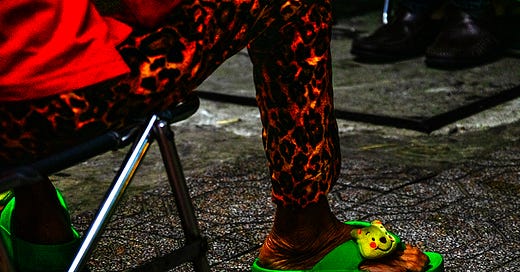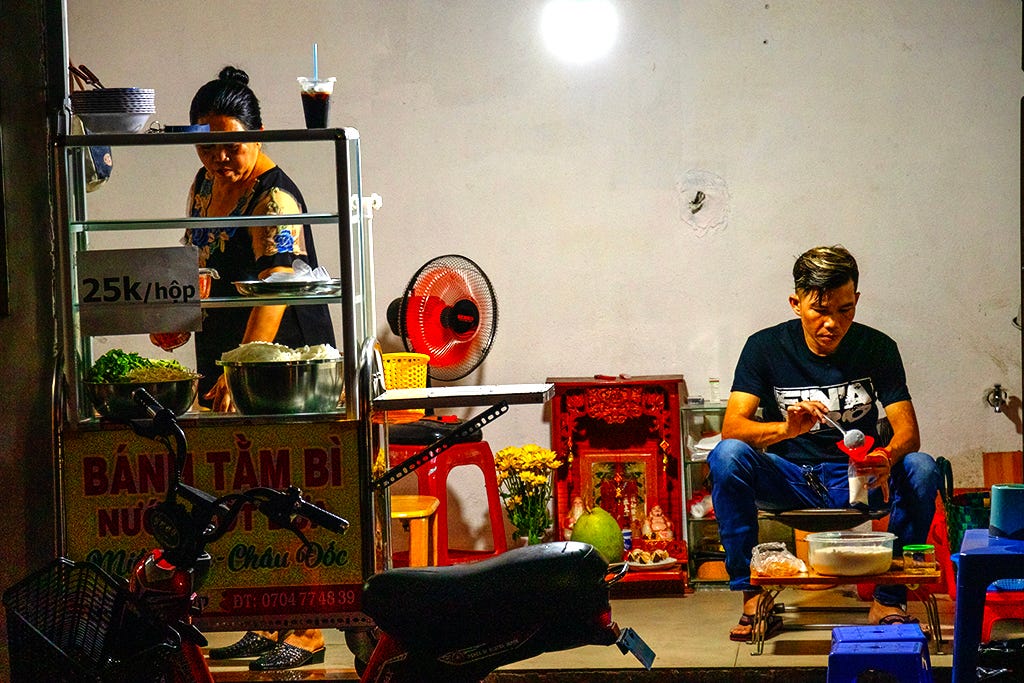[5:04AM at cafe on Đồng Khởi in Vung Tau on 2/22/24]
Admit it! Everything you’ve touched has turned to shit, and royally, too, so you’re lucky to still be upright, so kneel down now and apologize to everyone and everything! Since each failure has a moral component traceable to a deeply ingrained character flaw, you should have been locked up a century ago, or at least before birth! Lucky for you, everyone else was busy with their own unspeakable crimes, so you’re still free to mingle with the outwardly respectable. Leaning back without tipping over, you spew more nonsense, like everybody else.
This morning at the café on General Uprising, they were talking about men giving birth.
“It can happen,” declared that chubby seller of lottery tickets. “I read in the news that a man did give birth, three or four times even, in some country.”
“Old women told me that in the old days, men did give birth,” a man in his 50’s added with a straight face.
“It has to be done with surgery, of course.”
“And not through the asshole?” jumped in a second man, laughing.
“No, not through the asshole.” Chuckling, she added, “I like this idea. From now on, men should give birth, to give us women a rest.”
“So they can walk around to sell lottery tickets!”
Not sure if it was a dig, she only grinned.
Such nonsense about men giving birth can only be spawned from a society or era tragically divorced from nature. Spreading from the degenerate and insane West, such toxin has reached all corners of this earth, but at least in Southeast Asia, it hasn’t become orthodoxy. Interviewed by a YouTuber, no UPenn student dared to dismiss or mock this bullshit. Most simply agreed that, yes, uterus free humans can certainly give birth, so bulls, too, and cocks.
Just two generations ago, most Vietnamese were farmers. They didn’t just work the land but buried their dead right in the middle of rice paddies. Dominating the front room of each house was an altar, often elaborate, to their ancestors, so it was as much a death as a living room. Death was also coupled with life in their regular butchering of animals. Birth, life, decay and death, then, were all swirled together.
The conversation then veered into hiring a surrogate mother, but done traditionally, through intercourse. This kinky arrangement has at least two pitfalls. The young woman may decide to keep the baby or, worse, the husband might just dump his infertile wife, who’s also older, of course, thus less alluring than her sudden rival.
Lottery ticket seller, “Of course, only a young, attractive woman is chosen for this task. Who would want some bony, flat chested girl?”
More than taste, she’s also talking, most sensibly, of good genes. Horse, dog and cat breeders know all about this. Only progressive humans are so willfully blind.
Recently, I quoted a line from Winesburg, Ohio, but let’s give Sherwood Anderson’s infinitely rich masterpiece a closer look. It appeared in 1919, as modernity was just beginning. In an ironically named chapter, “Godliness,” Anderson encapsulates this shift most memorably:
In the last fifty years a vast change has taken place in the lives of our people. A revolution has in fact taken place. The coming of industrialism, attended by all the roar and rattle of affairs, the shrill cries of millions of new voices that have come among us from over seas, the going and coming coming of trains, the growth of cities, the building of the interurban car lines that weave in and out of towns and past farmhouses, and now in these later days the coming of the automobiles has worked a tremendous change in the lives and in the habits of thought of our people of Mid-America. Books, badly imagined and written though they may be in the hurry of our times, are in every household, magazines circulate by the millions of copies, newspapers are everywhere. In our day a farmer standing by the stove in the store in his village has his mind filled to overflowing with the words of other men. The newspapers and the magazines have pumped him full. Much of the old brutal ignorance that had in it also a kind of beautiful childlike innocence is gone forever. The farmer by the stove is brother to the men of the cities, and if you listen you will find him talking as glibly and as senselessly as the best city man of us all.
With roars, rattles and shrill cries from irresponsible or evil media, modernity can be defined as a cacophony of bullshit stuffed into each man, woman and child, so there’s no room left for his own reflections or even soul. Keep in mind Anderson’s observation was made before the television, nonstop idiotic or Satanic music and, of course, Facebook, Twitter, TikTok and online porn. After a century of such relentless programming, sanity is a canceled fugitive. Hijack the media and you enslave man.
In “Godliness,” there are five brothers, with the youngest frail, self absorbed, ambitious and ruthless. Unlike the others, he never labored on the family farm, but sent to the city to become a scholar and minister. After his brothers had been killed in the Civil War, Jesse Bentley returned home to rule, exploit and become great, “He wanted terribly to make his life a thing of great importance, and as he looked about at his fellow men and saw how like clods they lived it seemed to him that he could not bear to become also such a clod.”
Even his wife was dirt. He worked her to death and barely noticed her passing. Like a modern CEO, Jesse Bentley saw others as just resources:
In spite of his youth and inexperience, Jesse had the trick of mastering the souls of his people. He was so in earnest in everything he did and said that no one understood him. He made everyone on the farm work as they had never worked before and yet there was no joy in the work. If things went well they went well for Jesse and never for the people who were his dependents. Like a thousand other strong men who have come into the world here in America in these later times, Jesse was but half strong. He could master others but he could not master himself.
Though the soul destroying assembly line has not been perfected, Anderson could see what was coming. Men would become mere tools to be used up.
Melville’s “Bartleby, the Scrivener” is another American story that presages the future. In it, workers are still humans and humanely treated, however. After pointing out that one is most productive in the morning, while another is only useful in the afternoon, their boss cheerfully concludes, “Their fits relieved each other like guards. When Nippers’ was on, Turkey’s was off; and vice versa. This was a good natural arrangement under the circumstances.”
In 2024, it’s risky to declare anything as good or natural, so to be safe, you must only swoon over the weirdest, sickest or most freakish arrangements, but living in the West, you already know that by heart.
In this corner of Asia, I’m grateful to be among the still sane, thus civilized, but you need not believe me. Of course, you’re still the best.
[Vung Tau, 2/20/24]
[Vung Tau, 2/17/24]
[Vung Tau, 2/19/24]
[Vung Tau, 2/21/24]








Thank you for the Sherwood Anderson quote Linh. After mentioning him in your last piece, I remembered a poem about him by Charles Bukowski and had to look it up.
Both of my parents grew up on small family farms. The Sherwood Anderson line about the virtue of basic innocence reminded me of a photo of my paternal grandparents around the time of their marriage in the nineteen thirties. Those were hard times but the contentment in their faces was genuine. This one really hit home. Two generations removed from that and I can feel it. I'm so glad that I got to experience a small bit of that life before it went away. Summers detasseling corn stuck with me. I guess that's why working a ketchup tomato harvest recently was a true joy. I'd tear up sometimes as the sunrises hit us, sadness and joy too strong for a straight face. No big deal in the middle of a field.
566. one for Sherwood Anderson - Charles Bukowski
sometimes I forget about him and his peculiar
innocence, almost idiotic, awkward and mawkish.
he liked walking over bridges and through cornfields.
tonight I think about him, the way the lines were,
one felt space between his lines, were,
and felt space between his lines, air
and he told it so the lines remained
carved there
something like van Gogh.
he took his time
looking about
sometimes running to save something.
then at other times giving it all away
he didn't understand Hemingway's neon tattoo,
found Faulkner much too clever.
he was a midwestern hick
he took his time.
he was as far away from Fitzgerald as he was
from Paris
Here in my corner of Asia I’m pleased to know that you, Linh, have eyes to see what so many other people can’t see or pretend not to. Enjoy the rest of this beautiful day.